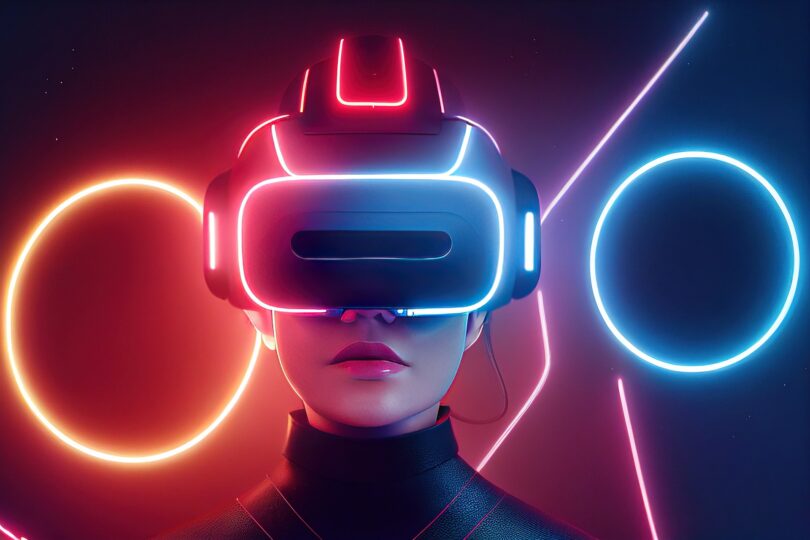Introduction:
Virtual reality (VR) has revolutionized the way we experience games, transporting players from their living rooms to immersive digital worlds. Over the past few years, VR technology has evolved at a rapid pace, offering gamers an unprecedented level of immersion and interaction. This convergence of gaming and virtual reality has opened up a realm of possibilities, redefining the boundaries of traditional gaming experiences.
Body:
One of the most compelling aspects of VR gaming is its ability to transport players to entirely new worlds. Whether it’s exploring alien landscapes, battling mythical creatures, or solving intricate puzzles, VR games offer an unparalleled sense of presence and immersion. With the use of headsets like the Oculus Rift, HTC Vive, or PlayStation VR, players can step into these virtual environments and become fully immersed in the action.
Moreover:
VR technology has enabled developers to experiment with innovative gameplay mechanics that simply wouldn’t be possible in traditional gaming. From using motion controllers to mimic real-world actions to implementing full-body tracking for more immersive experiences, VR games encourage players to interact with their virtual surroundings in entirely new ways. This level of interactivity not only enhances gameplay but also blurs the line between reality and fiction, creating truly unforgettable experiences.
Furthermore:
VR gaming has also emerged as a platform for social interaction, allowing players to connect with friends and strangers alike in virtual spaces. Whether it’s teaming up to tackle a cooperative mission or facing off in competitive multiplayer matches, VR games foster a sense of camaraderie and community among players. Platforms like VRChat and Rec Room provide virtual spaces where players can hang out, play games, and engage in social activities, regardless of physical distance.
Despite its many advancements:
VR gaming still faces several challenges, including accessibility and affordability. While the technology has become more affordable in recent years, high-quality VR headsets and compatible hardware still come with a hefty price tag, making them inaccessible to some gamers. Additionally, issues like motion sickness and discomfort can still plague some players, limiting the appeal of VR gaming to a niche audience.
In addition to immersive experiences and innovative gameplay mechanics:
VR gaming has also opened up new avenues for storytelling and narrative exploration. With the ability to fully immerse players in the game world, developers can create deeply engaging narratives that unfold in real time around the player. From epic adventures to intimate character-driven stories, VR games have the potential to evoke powerful emotions and create memorable experiences unlike anything seen before in traditional gaming. This fusion of storytelling and interactivity has the potential to redefine the way we experience narrative in video games, pushing the boundaries of what is possible in interactive entertainment. As VR technology continues to evolve and become more accessible, we can expect to see even more ambitious and groundbreaking storytelling experiences emerge, further solidifying VR gaming as a cornerstone of the gaming industry.
Moreover:
the integration of virtual reality technology into gaming has sparked a wave of creativity and experimentation among developers. From indie studios to major publishers, game creators are exploring the unique possibilities offered by VR to push the boundaries of game design. This has resulted in a diverse range of experiences, from adrenaline-pumping action games to meditative exploration titles. The immersive nature of VR allows developers to craft experiences that are not just games, but virtual worlds waiting to be discovered and explored. As a result, players are constantly being introduced to new and innovative gameplay mechanics, art styles, and storytelling techniques, enriching the gaming landscape and providing endless opportunities for discovery and enjoyment.
Furthermore:
the integration of virtual reality technology has not only transformed how we play games but has also opened up new avenues for education and training. VR simulations are being used across various industries, from healthcare to aviation, to provide hands-on training in a safe and controlled environment. For example, medical students can practice surgical procedures in virtual operating rooms, while pilots can hone their skills in realistic flight simulators. These applications not only enhance learning outcomes but also reduce the risks and costs associated with traditional training methods. By leveraging the immersive power of VR, training programs can provide a more engaging and effective learning experience, ultimately improving performance and proficiency in real-world scenarios. This convergence of gaming and virtual reality highlights the transformative potential of immersive technology beyond entertainment, shaping the way we learn and work in the digital age.
Moreover:
the integration of virtual reality technology has sparked a renaissance in the realm of cooperative and competitive gameplay experiences. VR multiplayer games offer an unprecedented level of social interaction, allowing players to team up with friends or compete against others in immersive virtual environments. Whether collaborating to solve puzzles, strategizing in intense battles, or simply hanging out in virtual spaces, VR multiplayer games foster connections and camaraderie among players like never before.
This social aspect of VR gaming not only enhances the overall experience but also has the potential to break down barriers and bring people together across distances, creating shared memories and forging lasting friendships. As multiplayer VR games continue to evolve and innovate, they are reshaping the way we connect and interact in the digital world, ushering in a new era of social gaming experiences.
Conclusion:
In conclusion, the marriage of gaming and virtual reality represents a significant milestone in the evolution of interactive entertainment. With its immersive experiences, innovative gameplay mechanics, and social potential, VR gaming has the power to transport players to new worlds and redefine the way we play. While challenges remain, the continued advancement of VR technology promises to bring even more immersive and engaging experiences to gamers around the world. As we look to the future, it’s clear that virtual reality will continue to play a transformative role in the world of gaming for years to come.








